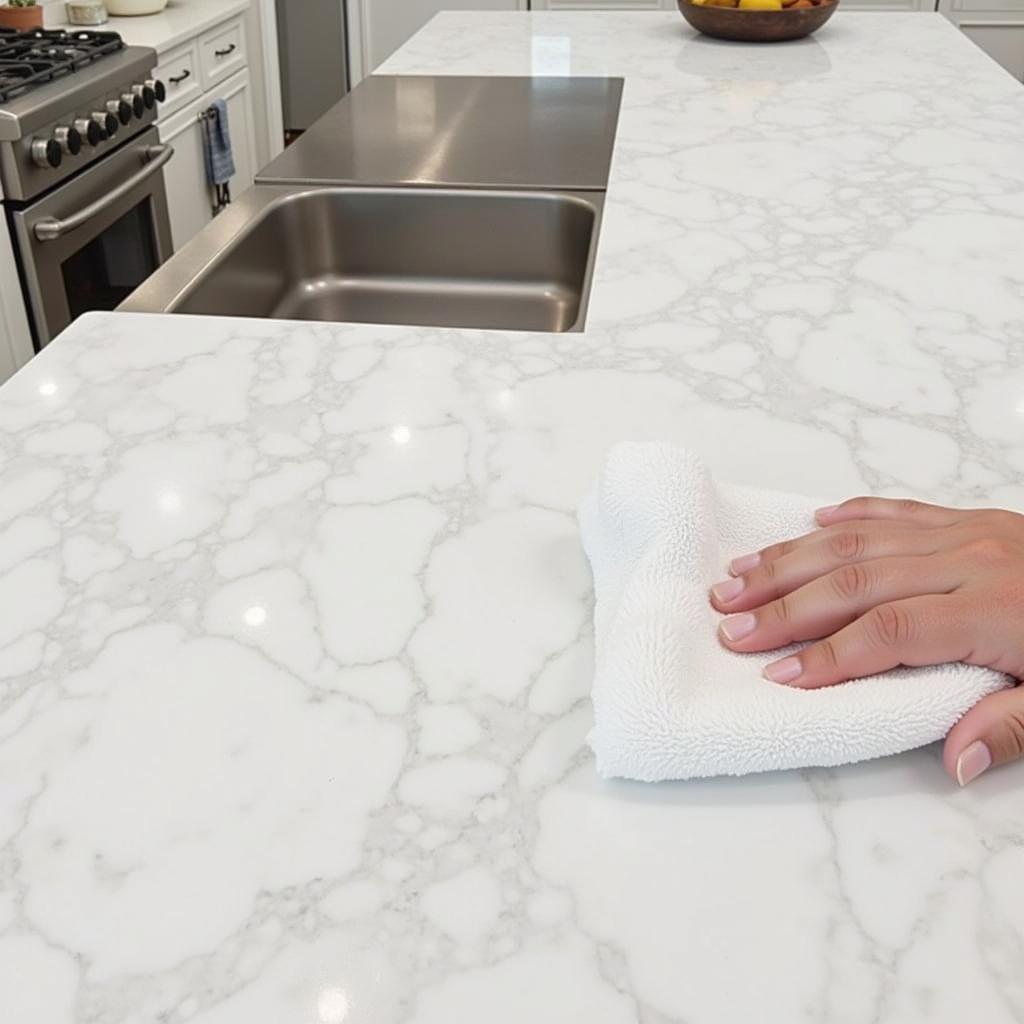Marble countertops are undeniably elegant, adding a touch of class to any kitchen. But when it comes to food preparation, a crucial question arises: Is Marble Food Safe? Let’s delve into the intricacies of using marble in your culinary space.
Understanding the Properties of Marble and Food Safety
Marble is a porous stone, meaning it has tiny holes that can absorb liquids and harbor bacteria. This porosity raises concerns regarding its suitability for direct food contact. While marble’s beauty is undeniable, its porous nature requires specific care and precautions to ensure food safety. It’s essential to understand these characteristics to make informed decisions about using marble in your kitchen. For vibrant food coloring needs, check out our selection of purple food colouring gel.
Porosity and Bacterial Growth
The porous nature of marble allows liquids to seep into the stone, creating an environment where bacteria can thrive. This is especially problematic with raw meat juices, which can contaminate the marble and potentially cross-contaminate other foods. Proper sealing and regular cleaning are critical to mitigate this risk.
Acid Sensitivity and Staining
Another factor to consider is marble’s sensitivity to acidic substances. Common kitchen ingredients like lemon juice, vinegar, and tomato sauce can etch the marble surface, leaving dull marks. These etched areas can further trap bacteria and become more difficult to clean. Using food coasters can help protect your marble from acidic substances.
Safe Practices for Using Marble in the Kitchen
While marble presents some challenges regarding food safety, it can be used safely with proper precautions.
Sealing and Maintenance
Sealing your marble countertops is the most important step in ensuring food safety. A good sealant creates a barrier that prevents liquids from penetrating the stone. It’s recommended to reseal marble countertops annually or as needed, depending on usage. This regular maintenance significantly reduces the risk of bacterial growth and staining. For those looking for a splash of color, you can even use turquoise blue food coloring in your baking endeavors.
Cleaning and Disinfection
Regular cleaning and disinfection are also crucial for maintaining a hygienic marble surface. Use a pH-neutral cleaner specifically designed for marble to avoid etching. After cleaning, disinfect the surface with a non-abrasive disinfectant.
Avoiding Direct Contact with Raw Foods
It’s best to avoid placing raw meat directly on marble. Always use a cutting board to prevent cross-contamination. Clean up spills immediately to minimize the risk of liquids seeping into the stone.
 Cleaning Marble Safely
Cleaning Marble Safely
Is it safe to put hot food on marble?
Yes, generally, it is safe to put hot food directly on marble. Marble is heat resistant and won’t scorch or crack easily. However, extreme temperature changes can sometimes cause stress fractures over time. Using trivets or hot pads is always a good practice to protect your marble’s finish.
Can I knead dough directly on marble?
While marble is a cool surface that can be helpful when working with dough, it’s still recommended to use a pastry mat or cutting board. This not only protects your marble from scratches but also makes cleanup easier. Thinking of vibrant baked goods? Consider using fuschia food color for a striking effect.
Expert Opinions on Marble and Food Safety
“Marble’s beauty should not overshadow the importance of food safety,” says renowned food safety expert, Dr. Amelia Stone. “Proper sealing and meticulous cleaning are paramount to mitigating the risks associated with its porous nature.”
Chef Marco Rossi adds, “While I appreciate the aesthetic appeal of marble, I always prioritize hygiene. Using cutting boards and diligently cleaning spills is essential in a professional kitchen.”
“Educating yourself on the properties of marble is key,” advises sanitation specialist, Ms. Clara White. “Understanding the potential risks allows you to implement effective strategies to ensure food safety in your kitchen.”
Conclusion
So, is marble food safe? With proper care and precautions, yes. Regular sealing, meticulous cleaning, and mindful food preparation practices can minimize the risks associated with marble’s porous nature. By understanding the properties of this beautiful stone and following these guidelines, you can enjoy the elegance of marble in your kitchen while ensuring a safe and hygienic food preparation environment. Are you looking for tips on dyeing eggs with gel food coloring? Check out our guide on dye eggs with gel food color.
FAQ
-
How often should I seal my marble countertops? Annually or as needed.
-
What type of cleaner should I use on marble? A pH-neutral cleaner designed for marble.
-
Can I cut directly on marble? No, always use a cutting board.
-
Is marble heat resistant? Yes, but extreme temperature changes can be damaging over time.
-
Can acidic foods damage marble? Yes, they can etch the surface.
-
How do I remove stains from marble? Consult a professional for stubborn stains.
-
Is marble more prone to bacteria than other countertop materials? It can be if not properly sealed and cleaned.
Need further assistance? Contact us at Phone Number: 02437655121, Email: minacones@gmail.com or visit our address: 3PGH+8R9, ĐT70A, thôn Trung, Bắc Từ Liêm, Hà Nội, Việt Nam. We have a 24/7 customer service team.